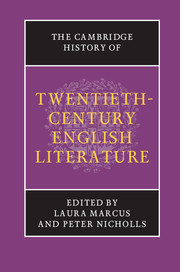Book contents
- Frontmatter
- Introduction
- PART ONE WRITING MODERNITY
- PART TWO THE EMERGING AVANT-GARDE
- PART THREE MODERNISM AND ITS AFTERMATH, 1918–1945
- 10 Trauma and war memory
- 11 The time–mind of the twenties
- 12 Modern life: fiction and satire
- 13 Modernist poetry and poetics
- 14 Modernity and myth
- 15 Psychoanalysis and literature
- 16 Biography and autobiography
- 17 ‘Speed, violence, women, America’: popular fictions
- 18 Theatre and drama between the wars
- 19 Literature and cinema
- 20 The thirties: politics, authority, perspective
- 21 Literary criticism and cultural politics
- 22 Surrealism in England
- 23 World War II: contested Europe
- 24 World War II: the city in ruins
- PART FOUR POST-WAR CULTURES, 1945–1970
- PART FIVE TOWARDS THE MILLENNIUM, 1970–2000
- Bibliography
- Index
- References
14 - Modernity and myth
from PART THREE - MODERNISM AND ITS AFTERMATH, 1918–1945
Published online by Cambridge University Press: 28 March 2008
- Frontmatter
- Introduction
- PART ONE WRITING MODERNITY
- PART TWO THE EMERGING AVANT-GARDE
- PART THREE MODERNISM AND ITS AFTERMATH, 1918–1945
- 10 Trauma and war memory
- 11 The time–mind of the twenties
- 12 Modern life: fiction and satire
- 13 Modernist poetry and poetics
- 14 Modernity and myth
- 15 Psychoanalysis and literature
- 16 Biography and autobiography
- 17 ‘Speed, violence, women, America’: popular fictions
- 18 Theatre and drama between the wars
- 19 Literature and cinema
- 20 The thirties: politics, authority, perspective
- 21 Literary criticism and cultural politics
- 22 Surrealism in England
- 23 World War II: contested Europe
- 24 World War II: the city in ruins
- PART FOUR POST-WAR CULTURES, 1945–1970
- PART FIVE TOWARDS THE MILLENNIUM, 1970–2000
- Bibliography
- Index
- References
Summary
We are perhaps entitled to assume that the words ‘myth’ and ‘modernity’ named sharply antithetical things. Myths are thought to be primordial and universal. Modernity, along with its cultural and artistic complement, Modernism, is both urgently present and geopolitically particular. Myths and mythical thinking are what modern culture has gone beyond and, whether willingly or unwillingly, left behind. The effort to understand, engage with or revive myth is an effort on the part of modern writers and artists to enter into habits of thought, belief and feeling that are nothing if they are not not-modern. The point of myth is precisely that it is not modern, and the pursuit of myth is therefore a form of the effort to ‘think the unthought’ that seems to be a definitional part of Modernist cultural aspiration.
Modernity is sometimes identified with the ideal of Enlightenment that grew up in the late seventeenth and early eighteenth centuries. But the Enlightenment relationship to myth is much simpler than that of Modernism. For early Enlightenment thinkers such as Bernard de Fontenelle, myth was part of the apparatus of superstition, credulity and ignorance from which reason was attempting to unpick itself. Myth was, in a sense, the past itself, insofar as the past came to be thought of, not merely as different from the present, but as darkness, error, infancy, impediment, in short, as the antagonist of the present as it strove to realise itself. But the capacity of reason to free itself from myth could also be a proof of its self-corrective capacity.
- Type
- Chapter
- Information
- The Cambridge History of Twentieth-Century English Literature , pp. 251 - 268Publisher: Cambridge University PressPrint publication year: 2005
References
- 1
- Cited by

